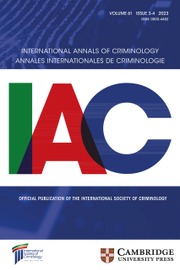No CrossRef data available.
Article contents
Experiences of Anti-Human Trafficking Unit Functionaries in Gujarat (India): A Critical Analysis
Published online by Cambridge University Press: 25 January 2022
Abstract
In 2006, the United Nations Office on Drugs and Crime in South Asia, in partnership with the Ministry of Home Affairs, Government of India, initiated Project IND/S16. In the beginning, five states were selected to train police officials under the “Strengthening the Law Enforcement Response to Human Trafficking” project. The training program resulted from a study done by two researchers, Dr. P. M. Nair and Shanker Seen. Their study recommended training programs to strengthen the law enforcement response to human trafficking and establish anti-human trafficking units (AHTUs) in India. However, no evaluation of the work of functionaries of AHTUs was done until the authors of this article took the initiative with the support of the Additional Director General of Police of Gujarat to identify the major problems in AHTUs at the grassroots level. Their exploratory research covered the 40 AHTUs from all 33 districts of Gujarat, focusing on the experiences and opinions of 214 police authorities (i.e. police inspectors, police sub-inspectors, assistant sub-inspectors, constables, and Lok Rakshak (public guards)) officially assigned to the AHTUs of Gujarat. This article summarizes the research and is based on experiences documented while collecting information in the field.
Abstracto
En 2006, la Oficina de las Naciones Unidas contra la Droga y el Delito en Asia Meridional, en asociación con el Ministerio del Interior del Gobierno de la India, inició el Proyecto IND/S16. Al principio, se seleccionaron cinco estados para capacitar a los agentes de policía en el marco del proyecto “Fortalecimiento de la respuesta de las fuerzas del orden a la trata de personas”. El programa de capacitación fue el resultado de un estudio realizado por dos investigadores, el Dr. PM Nair y Shanker Seen. Su estudio recomendó capacitación programas para fortalecer la respuesta de las fuerzas del orden público a la trata de personas y establecer Unidades de Lucha contra la Trata de Personas (AHTU) en la India. Sin embargo, no se realizó ninguna evaluación del trabajo de los funcionarios de las AHTU hasta que los autores de este artículo tomaron la iniciativa con el apoyo de la Director General de Policía de Gujarat adicional para identificar los principales problemas en las AHTU a nivel de base. Su investigación exploratoria abarcó las cuarenta unidades de lucha contra la trata de personas de los 33 distritos de Gujarat, centrándose en las experiencias y opiniones de 214 autoridades policiales (es decir, inspectores de policía, subinspectores de policía, subinspectores auxiliares, agentes y Lok Rakshak) asignados oficialmente a la Unidades de lucha contra la trata de personas de Gujarat. Este artículo resume la investigación y se basa en las experiencias vividas al recopilar información sobre el terreno.
Abstrait
En 2006, l’Office des Nations Unies contre la drogue et le crime en Asie du Sud, en partenariat avec le ministère de l’Intérieur du gouvernement indien, a lancé le projet IND/S16. Au début, cinq États ont été sélectionnés pour former des agents de police dans le cadre du projet « Renforcer la réponse de l’application de la loi à la traite des êtres humains ». Le programme de formation est le résultat d’une étude réalisée par deux chercheurs, le Dr PM Nair et Shanker Seen. Leur étude a recommandé une formation programmes visant à renforcer la réponse des forces de l’ordre à la traite des êtres humains et à établir des unités de lutte contre la traite des êtres humains (AHTU) en Inde. Cependant, aucune évaluation du travail des fonctionnaires des AHTU n’a été faite jusqu'à ce que les auteurs de cet article prennent l’initiative avec le soutien de la Directeur général supplémentaire de la police du Gujarat pour identifier les principaux problèmes des AHTU au niveau local. Leur recherche exploratoire a couvert les quarante unités de lutte contre la traite des êtres humains des trente-trois districts du Gujarat, en se concentrant sur les expériences et les opinions de 214 autorités policières (c’est-à-dire les inspecteurs de police, les sous-inspecteurs de police, les sous-inspecteurs adjoints, les agents et Lok Rakshak) officiellement affectés au unités de lutte contre la traite des êtres humains du Gujarat. Cet article résume la recherche et s’appuie sur des expériences ressenties lors de la collecte d’informations sur le terrain.
الملخص
في عام 2006 ، بدأ مكتب الأمم المتحدة المعني بالمخدرات والجريمة في جنوب آسيا ، بالشراكة مع وزارة الشؤون الداخلية ، حكومة الهند ، مشروع IND/S16. في البداية ، تم اختيار خمس ولايات لتدريب ضباط الشرطة في إطار مشروع “تعزيز استجابة إنفاذ القانون للاتجار بالبشر”. نتج البرنامج التدريبي عن دراسة قام بها باحثان هما الدكتور ب. م. ناير وشانكر سين. وأوصت الدراسة بالتدريب برامج لتعزيز استجابة إنفاذ القانون للاتجار بالبشر وإنشاء وحدات لمكافحة الاتجار بالبشر (AHTU) في الهند. ومع ذلك ، لم يتم إجراء أي تقييم لعمل موظفي AHTUs حتى اتخذ مؤلفو هذا المقال زمام المبادرة بدعم من المدير العام الإضافي لشرطة غوجارات لتحديد المشاكل الرئيسية في AHTUs على مستوى القاعدة. غطت أبحاثهم الاستكشافية الأربعين وحدة لمكافحة الاتجار بالبشر من جميع المقاطعات الثلاث والثلاثين في ولاية غوجارات ، مع التركيز على تجارب وآراء 214 سلطة شرطة (على سبيل المثال ، مفتشو الشرطة ومفتشو الشرطة المساعدون والمفتشون المساعدون والشرطة ولوك راكشاك) المعينون رسميًا إلى وحدات مكافحة الاتجار بالبشر في ولاية غوجارات. تلخص هذه المقالة البحث وتستند إلى الخبرات المكتسبة أثناء جمع المعلومات في هذا المجال.
抽象的
2006 年, 联合国南亚毒品和犯罪问题办公室与印度政府内政部合作启动了 IND/S16 项目。一开始,在“加强对人口贩运的执法反应”项目下,选择了五个州来培训警察。该培训计划来自两位研究人员 PM Nair 博士和 Shanker Seen 的研究。他们的研究推荐了培训加强对人口贩运的执法反应并在印度建立反人口贩运单位 (AHTU) 的计划。但是,直到本文作者在该机构的支持下采取主动,才对 AHTU 工作人员的工作进行评估增设古吉拉特邦警察总长,在基层查明 AHTU 的主要问题。他们的探索性研究涵盖了古吉拉特邦所有 33 个地区的 40 个反人口贩运单位,重点关注 214 个警察当局的经验和意见(即警察督察、警察副督察、助理副督察、警员和 Lok Rakshak)正式分配给古吉拉特邦反人口贩卖单位。本文总结了这项研究,并基于收集该领域信息时的经验。
Keywords
- Type
- Article
- Information
- Copyright
- © International Society of Criminology 2022




